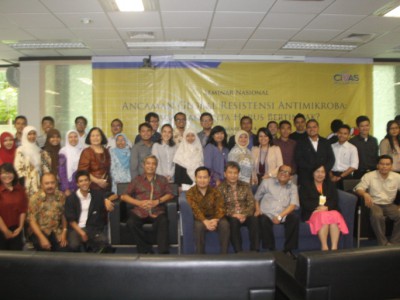Poultry Health Management Training
Thursday, 9 November 2006
Animal health is the major item which should be considered when developing a livestock business. This matter is closely related with the emerging of various diseases in livestock. Livestock business profile in the primary sector shows that a poultry business provides better business opportunity as long as the husbandry management includes animal health management in accordance with the current valid procedures and regulations. In other words, if the animal health management in livestock is done optimally, then the emerging of various diseases can be reduced as much as possible.
Livestock in Indonesia, generally in sector III and IV, has not demonstrated optimal implementation of animal health management. This is related with the purpose of livestock business. Sector I and II usually has good management systems in many parts including animal health. However, in sector III and IV, some farmers/breeders cultivate poultry only as a business branch, although in relatively small-scale business. This can be understood because the commercial livestock are managed in a right management pattern to obtain big profit. On the contrary, common farmers do not know about certain patterns and maintenance is usually done as part-time.
In majority, farmers/breeders from sector IV do not understand animal health. This can be seen from the husbandry system which is still traditional. For example, the birds are left wandering in people’s yard with any available feed and without any efforts to prevent the diseases. This condition makes the poultry highly at risk and susceptible to infectious animal diseases. Various kinds of infectious disease in poultry has been reported in Indonesia, but the diseases which are now of main concern are those caused by virus such as Avian Influenza (AI), Newcastle Disease (ND) or Tetelo, Infectious Bronchitis (IB), Infectious Laryngotracheitis (ILT), Marek’s disease, and Infectious Bursal Disease (IBD) or Gumboro.
Other than animal health, another item which is also related with animal health and of no less importance is biosecurity. Limitation of people/worker and vehicle trafficking in farms is a biosecurity measure to prevent AI spread. Besides that, AI control also includes management of poultry and poultry products traffic and cleaning of equipment in regions at risk.
Sector I and II is a commercial company with strict biosecurity and closed system thus it has the potential to decrease AI infection compared to other kind of farms. Sector III is a commercial company with or without strict biosecurity and opened system which can have indirect contact with other farms therefore sector III is easier to be infected compared with sector I and sector II. Furthermore, sector IV which has a very open system and not application of biosecurity measures is easier to be infected than sector I, II, and III. This can be understood because commercial farms with strict biosecurity and closed system can prevent contact between poultry and human or other animal or wild birds. Generally, sector I and II farms are strictly limiting the trafficking of contaminant material such as poultry, poultry products, feed, manure, feather and cage trays. They also limit the trafficking of people/workers and vehicle that enter or exit the farm. Workers’ health in sector I and II farms are usually examined periodically. Possibily, this is what causes the AI occurrence in sector I and II farms are less than the others. On the contrary, sector III and IV which have an open system makes it possible to be infected by AI from the outside, so that sector III and mainly sector IV farms are more easily infected than sector I and sector II.
Concerning about all the things above, Indonesia and Netherlands have made an agreement to undergo some cooperation in the development and implementation of High Pathogenic Avian Influenza (HPAI) control programs. One of the projects which have been done in this cooperation program was conducting an outfield vaccination study in Sukabumi district. This study was aimed to conduct poultry health management training program in a farm for farmers and also to strengthen the capacity of CIVAS and livestock services officers in recommending poultry health management implementation and handling its problems in field.
The objectives from the Poultry Health Management Training were: to give knowledge about Poultry Health Management and Biosecurity for farmers, project staff and veterinarians, to provide knowledge and better understanding on the role of sentinels in the DIVA strategy and the field trial, recommendations for practical and feasible on-farm biosecurity measures to prevent HPAI infections and spread of the virus, recommendations for practical and feasible personal biosecurity measures for CIVAS and livestock services officers and farmers to protect themselves from HPAI virus.
The Poultry Health Management Training was held for four days at GG House Happy Valley, Gadog Jawa Barat. It began from Monday (November 6th, 2006) through to Thursday (November 9th, 2006). This training was attended by 28 participants which consist of farmers, district livestock services officers of Sukabumi district, and CIVAS who were engaged and involve in HPAI prevention, control and eradication activities.










